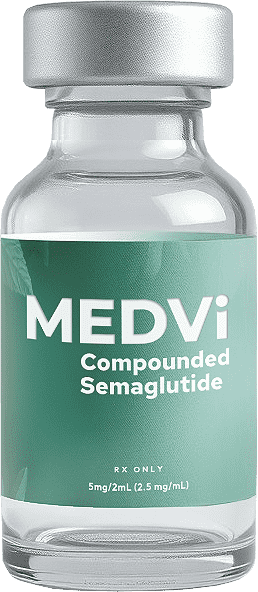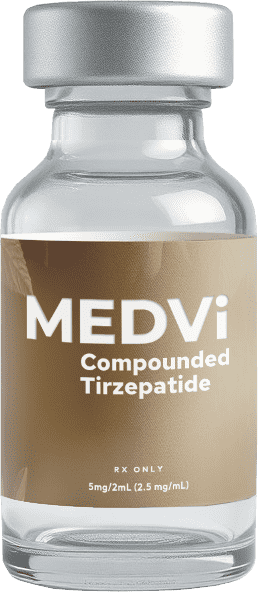Published: May 2025
If you’re managing diabetes or pursuing weight loss with semaglutide, you’ve likely wondered about medication expiration dates. The question “what happens if you use expired semaglutide” is more common than you might think, especially given the medication’s cost and accessibility challenges many patients face.
Understanding the implications of using expired semaglutide is crucial for your health and safety. This comprehensive guide will explore the risks, effects, and safer alternatives to help you make informed decisions about your medication management.
Understanding Semaglutide and Its Stability
Semaglutide belongs to a class of medications called GLP-1 receptor agonists. Whether used for type 2 diabetes management (Ozempic) or weight loss (Wegovy), the medication’s effectiveness depends on its molecular stability and potency.
The active pharmaceutical ingredient in semaglutide is a complex peptide that can degrade over time. This degradation process accelerates under certain conditions, including:
- Temperature fluctuations
- Exposure to light
- Humidity changes
- Time beyond the manufacturer’s expiration date
When pharmaceutical companies establish expiration dates, they indicate when the medication maintains at least 90% of its original potency under proper storage conditions.
What Happens When You Use Expired Semaglutide
Reduced Effectiveness
The primary concern with using expired semaglutide isn’t necessarily immediate danger, but somewhat diminished therapeutic effectiveness. As the medication degrades:
Blood Sugar Control May Suffer: For diabetes patients, reduced potency means less effective glucose management. Your blood sugar levels might become less stable, potentially leading to dangerous spikes or requiring adjustments to other medications.
Weight Loss Plateaus: People using semaglutide for weight management may experience stalled progress or reduced appetite suppression, which can undermine their health goals.
Inconsistent Results: The degradation process isn’t uniform, meaning some doses might be significantly less potent than others, creating unpredictable therapeutic outcomes.
Potential Safety Concerns
While expired semaglutide is generally considered less dangerous than some other expired medications, several safety considerations exist:
Bacterial Growth Risk: Injectable medications stored before expiration, especially if not adequately refrigerated, may develop bacterial contamination. This risk increases significantly with improper storage.
Chemical Byproducts: As semaglutide degrades, it may form breakdown products. While these aren’t typically toxic in small amounts, their long-term effects aren’t well-studied.
Injection Site Reactions: Degraded medication might cause increased irritation, redness, or discomfort at injection sites.
Timeline of Degradation
Understanding how quickly semaglutide loses potency can help you make informed decisions:
1-3 Months Past Expiration: The medication likely retains 80-90% effectiveness if properly stored. 3-6 Months Past Expiration: Potency may drop to 70-80%, with noticeable therapeutic differences. 6+ Months Past Expiration: Significant loss of effectiveness, with minimal therapeutic benefit
These timelines assume proper refrigeration. Room temperature storage accelerates degradation considerably.
Signs Your Semaglutide Has Degraded
Recognizing when your medication has deteriorated is essential for safety:
Visual Inspection
- Cloudiness or Particles: Fresh semaglutide should be clear and colorless
- Color Changes: Any yellowing, browning, or discoloration indicates degradation
- Crystallization: Visible crystals or precipitation suggest the medication is no longer viable
- Clumping: Any solid matter or unusual texture changes
Therapeutic Signs
- Reduced Appetite Suppression: Less effective hunger control
- Blood Sugar Instability: Higher or more variable glucose readings
- Plateau in Weight Loss: Stalled progress despite consistent use
- Return of Previous Symptoms: Diabetes symptoms or increased cravings
Safe Alternatives to Using Expired Medication
Proper Storage Practices
Extending your semaglutide’s shelf life starts with proper storage:
Refrigeration Requirements: Store between 36-46°F (2-8°C) until first use. Room Temperature Guidelines: Most formulations can remain at room temperature for 56 days after opening. Light Protection: Keep in original packaging to prevent light degradation.
Handling Precautions: Avoid shaking or dropping, which can damage the peptide structure
Accessing Fresh Medication
Insurance Navigation: Work with your healthcare provider to understand coverage options and prior authorization requirements
Patient Assistance Programs: Many manufacturers offer programs for eligible patients facing financial hardship
Prescription Timing: Plan refills to avoid gaps in medication availability
Alternative Formulations: Discuss different semaglutide products or similar medications with your doctor
The Importance of Professional Guidance
When to Consult Your Healthcare Provider
Contact your medical team immediately if you:
- Have used expired semaglutide and experienced unusual symptoms
- Are you considering using expired medication due to access issues
- Notice changes in your medication’s appearance or effectiveness
- Need help navigating insurance or financial barriers to fresh medication
Treatment Adjustments
Your healthcare provider can help by:
- Adjusting dosing schedules to maximize medication effectiveness
- Exploring alternative GLP-1 receptor agonists
- Implementing bridging strategies during medication transitions
- Monitoring for any adverse effects from degraded medication
Ensuring Medication Safety and Efficacy
Quality Assurance Matters
The pharmaceutical supply chain involves rigorous quality control measures to ensure medication safety and effectiveness. When you use expired semaglutide, you’re essentially bypassing these safety measures.
Manufacturing Standards: Legitimate pharmaceutical companies follow strict FDA guidelines for production, storage, and distribution
Cold Chain Management: Proper temperature control throughout the supply chain maintains medication integrity
Regular Testing: Fresh medications undergo batch testing to verify potency and purity
Making Informed Decisions
While using expired semaglutide occasionally might not cause immediate harm, it’s not a sustainable or safe long-term strategy. The risks of reduced effectiveness, potential contamination, and unpredictable therapeutic outcomes outweigh any short-term cost savings.
Finding Reliable Semaglutide Solutions
If you’re struggling with medication access or considering expired options due to cost concerns, explore legitimate alternatives:
Telemedicine Platforms: Many online healthcare providers offer convenient access to semaglutide prescriptions with competitive pricing
Compounding Pharmacies: Licensed compounding facilities can provide semaglutide formulations that meet your specific needs
Patient Advocacy: Healthcare advocates can help navigate insurance challenges and identify assistance programs
At Medvi.io, we understand patients’ challenges in accessing consistent, high-quality semaglutide therapy. Our platform provides access to fresh, properly stored medication through licensed healthcare providers, ensuring you receive the full therapeutic benefit of your treatment.
Conclusion
Using expired semaglutide poses risks beyond simple ineffectiveness. While it might seem like a cost-effective solution, the potential for reduced blood sugar control, diminished weight loss results, and safety concerns make it an unwise choice.
The question “What happens if you use expired semaglutide?” has a clear answer: you compromise your health outcomes and potentially expose yourself to unnecessary risks. Instead of risking your health with expired medication, explore legitimate options for accessing fresh, effective semaglutide through proper medical channels.
Remember, your health is an investment, not an expense. Working with qualified healthcare providers and legitimate pharmaceutical sources ensures you receive the full benefits of semaglutide therapy safely and effectively.
For reliable access to fresh semaglutide and professional medical guidance, consider exploring options through established telemedicine platforms like Medvi.io. Patient safety and therapeutic effectiveness remain the top priorities on these platforms.



